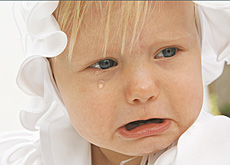“Angelina” shoots up Swiss baby name chart

Leonie and David, Emma and Théo, Sara and Mattia were the most popular names last year in Switzerland's three main language regions.
Angelina and Silas were the highest climbers, according to the latest “First name hit parade” published regularly by the Federal Statistics Office.
The authorities say 37,569 boys and 35,334 girls were born in Switzerland in 2005, 180 babies down on 2004. A list of the most popular names in German-, French- and Italian-speaking parts of the country has been published since 1987.
Leonie was the favourite girl’s name in the main German-speaking part of Switzerland, followed by Anna, Lara, Laura and Julia. David beat off another biblical name, Noah, in the boys’ chart with Joël, Tim and Luca not far behind.
Luca had enjoyed the number one position since 1997. “It’s hard to say why some names go up and some go down,” Marcel Heiniger, from the demographic section of the statistics office, told swissinfo. “Maybe Luca has had his time in the limelight.”
In French-speaking Switzerland, Emma was a clear winner for the ladies, followed by Léa (number one from 1998 to 2003), Sarah, Camille and Chloé. Théo just pipped Luca, who in turn edged Noah, Maxime and Nathan.
In the Italian-speaking part of the country, Mattia and Matteo topped the male chart ahead of Alessandro, Luca and Andrea. Sara beat off competition from Giada, 2004 winner Giulia, Alice and Sofia.
Switzerland’s 35,000 Romansh speakers did breed in 2005 but the small numbers involved means it’s hard to glean meaningful information. The most popular boy’s name was Laurin (with three reported cases) and, for girls, Jana with four.
Popular influences
Swiss parents have traditionally played it straight when choosing names for their children – no Moon Unit Zappas or Little Pixie Geldofs here – but pop culture appears to be exerting an increasing influence.
The biggest climber on the Swiss chart was Angelina, which rose from 121st position in 2003 to 41st in 2005.
Analysing baby names is hardly an exact science, but it’s a relatively safe bet that the blanket media coverage of American film star Angelina Jolie played a role.
Quite why Silas rose from 73rd to 39th is less clear, although it is the name of a central character in the bestseller novel and film, The Da Vinci Code.
“I think pop culture plays a role to a certain degree,” said Heiniger. “Fiona for example has risen quite dramatically – it more than doubled between 2003 and 2005 – and my interpretation is that it’s a result of last year’s Miss Switzerland, Fiona Hefti.”
Heiniger also said it would be interesting whether the Swiss football team’s success at the recent World Cup would have an effect on next year’s list.
“Jakob, for example, is a very old-fashioned name but following the success of ‘Köbi’ Kuhn [the national team’s manager], maybe in 2006 we will see more Jakobs,” he said.
One of the reasons why Swiss parents in the past didn’t opt for unusual names was that they couldn’t. Local registry offices would veto any names deemed inappropriate.
In one relatively high-profile case ten years ago, Christine Lauterburg, a famous-within-Switzerland musician, was told she couldn’t call her daughter “Lexikon”.
Nowadays however all local registries agree with the line taken by Zurich’s civil registrar that “parents are basically free to choose their child’s name as long as it is not likely to damage the interests of the child”.
swissinfo, Thomas Stephens
The Federal Statistics Office has been publishing a list of the most popular names in Switzerland since 1987.
The figures are based on data provided by the official registry offices in the 26 cantons.
Of Switzerland’s 7.4 million inhabitants, 63.5% speak German, 20.5% French, 6.5% Italian and 0.5% Romansh.
Leonie and David were the most popular names in the German-speaking part of Switzerland in 2005.
Emma and Théo are top of the list in the French-speaking region.
Sara and Mattia were top in the Italian-speaking regions and Laurin and Jana were most popular choices for Romansh speakers.

In compliance with the JTI standards
More: SWI swissinfo.ch certified by the Journalism Trust Initiative











You can find an overview of ongoing debates with our journalists here . Please join us!
If you want to start a conversation about a topic raised in this article or want to report factual errors, email us at english@swissinfo.ch.